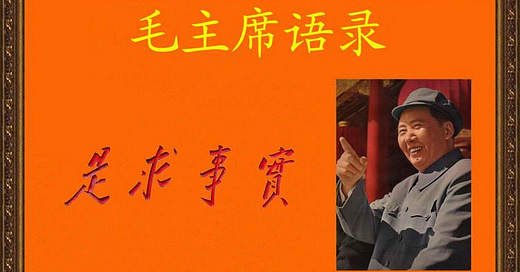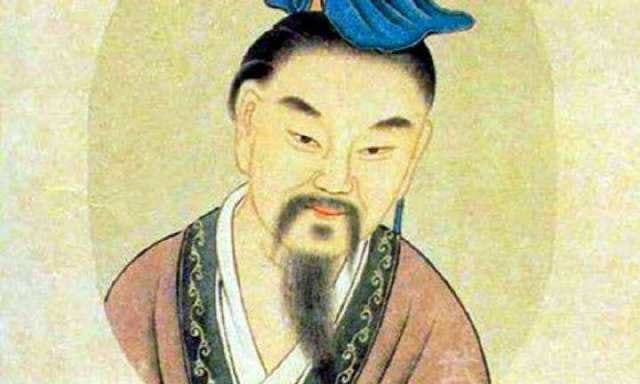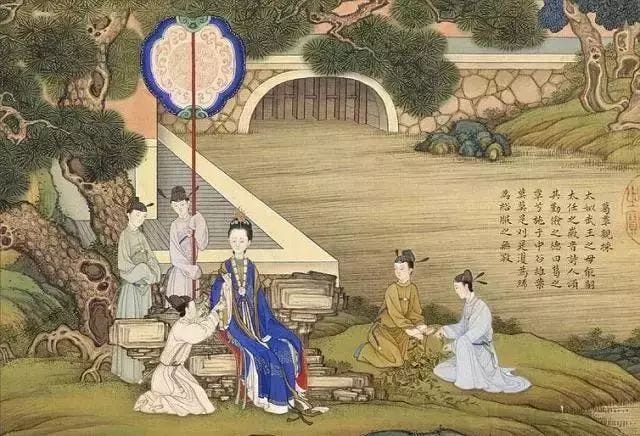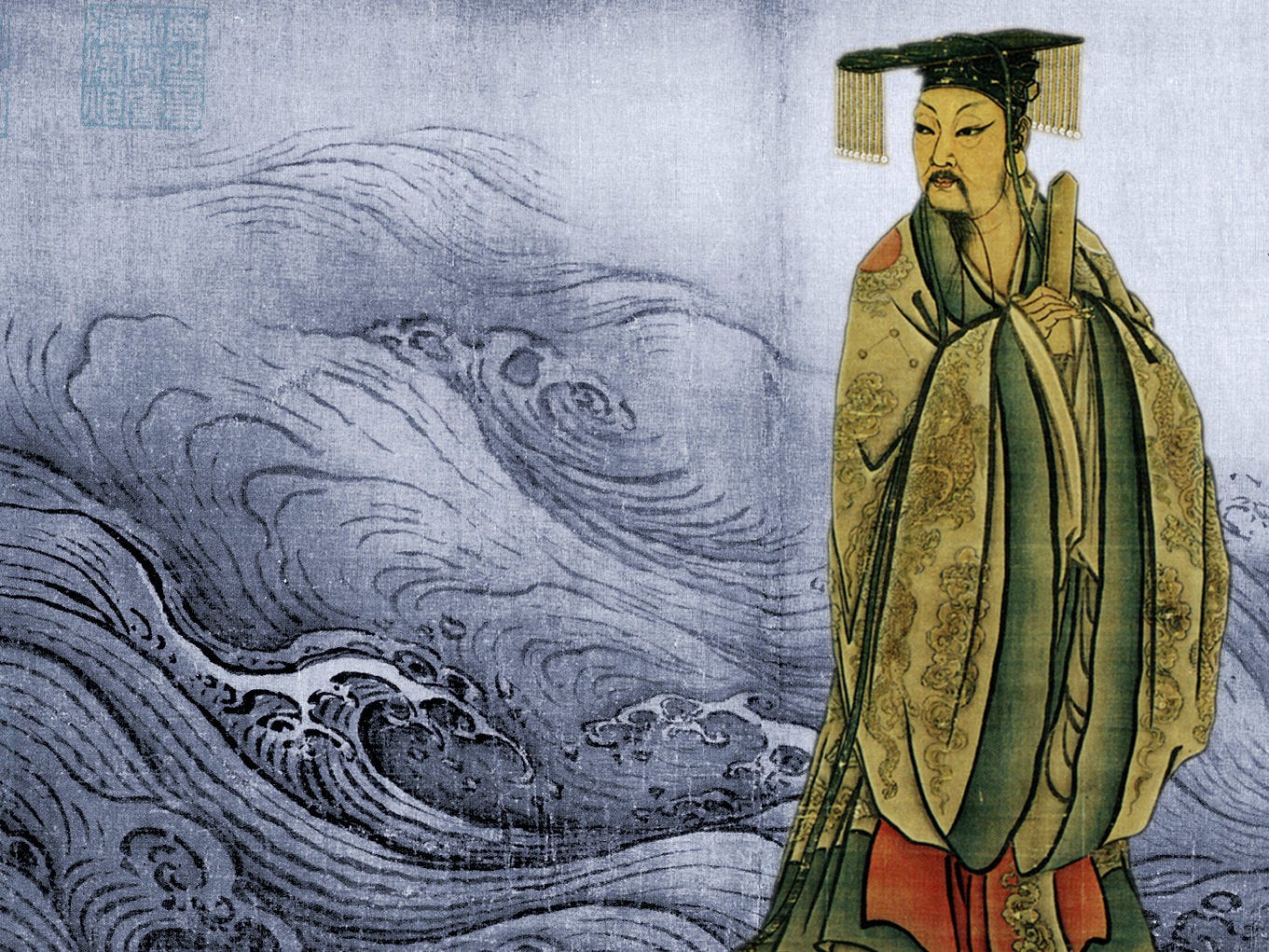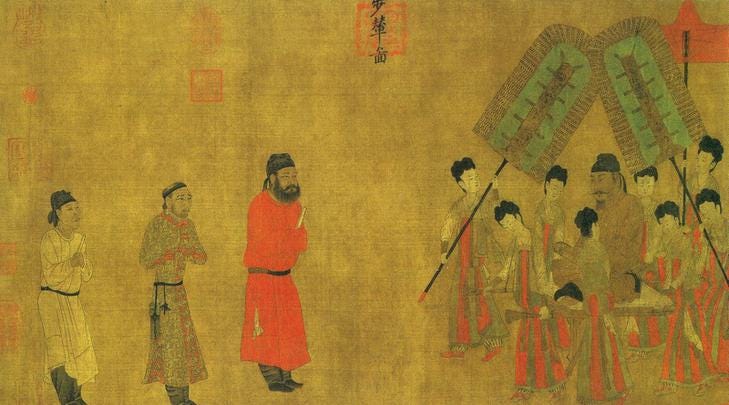The lexicology of shi 事
I will thrust you from your office, and you will be cast down from your station. (Is 22:19)
‘Ta bu dong shir.’ 他不懂事儿. This is something that is commonly said in China, usually of a child who is ill-mannered or badly-behaved, or of someone who is new in a particular position or job who doesn’t know how things are done.
There is another common phrase: shishi qiu shi 实事求是 ‘seek truth from facts’, a well-known slogan of Chinese Marxism, having been popularised by Chairman Mao Zedong. This is a great phrase, and I approve of Mao’s use of it. Despite its adoption by the Marxists, however, it is not a phrase original to them. In fact, it comes from the Book of Han 《漢書》 written by Ritual School historian Ban Gu 班固 (32 – 92 AD), who used the phrase approvingly to describe the governance style of Liu De 刘德, the third son of Emperor Jing of Han 汉景帝. (It is a custom of long standing in Marxism to take ideas from other intellectual streams and present them as their own revolutionary ideas, going back to Marx’s appropriation of Saint Luke.)
The term shi 事 in general, however, connotes a ‘thing’, or ‘stuff’, or a ‘situation’. It’s a lexeme that appears frequently by itself (either as shi 事 or the colloquial shir 事儿), but also in compound words. Shiqing 事情 ‘affair, matter’ is by far and away the most common in modern Mandarin, though shijian 事件 ‘incident, event, happening’ is also widely seen. Other common compounds are the aforementioned shishi 事实 ‘fact’; shiwu 事物 ‘tasks, work, affairs’; shigu 事故 ‘accident’; and shiye 事业 ‘project, (great) undertaking, cause, career’.
Shi 事 is also used as a modifier that corresponds to the governmental or official English usage of ‘affairs’: junshi 军事 ‘military affairs’; waishi 外事 ‘foreign affairs’; neishi 内事 ‘internal affairs’; guoshi 国事 ‘national affairs’; shangshi 商事 ‘commercial affairs’ and so on. It can also be used in compounds like tongshi 同事 ‘colleague, coworker’; qishi 起事 or shengshi 生事 ‘to pick a fight, to start trouble, to make a scene, to make something of’; qingshi 情事 ‘matters of the heart, romance’ and fangshi 房事 ‘lovemaking, marital relations’; banshi 办事 ‘to take care of business’; jishi 急事 ‘urgent matter’ and guaishi 怪事 ‘strange occurrence’.
The character shi 事 is an ideogram representing a hand (shou 手) holding a spear (mao 矛) or a flag (yan 㫃) upright or planting it in the ground. This ideogram was taken very early to represent an assignment or a task delegated to a person. The Shuowen jiezi of Xu Shen links this character to shi 史 ‘official, scribe, to mark, history’; from this etymology, connexions with the related characters li吏 ‘minor government official’ and shi 使 ‘to cause, to compel, to induce’ are not difficult to derive. In addition, the Classical-era glossary Erya links shi 事 to other words denoting assigned activities or tasks: ji 績 ‘to achieve’; xu 緒 ‘to begin’; cai 采 ‘to pluck, to gather’; ye 業 ‘work, task, accomplishment’ (same word function as the modern shiye 事业 above); fu 服 ‘to serve, to submit, to obey’; yi 宜 ‘should, obligation, proper’; lao 勞 ‘to labour, to toil’; qin 勤 ‘duties, service, diligent’.
In the Classics, the term shi 事 generally can be glossed as ‘affairs’, ‘business’ or ‘service’. We can see its usage in the Odes here, for example:
維此文王、小心翼翼。
昭事上帝、聿懷多福。
厥德不回、以受方國。This king Wen,
Watchfully and reverently,
With entire intelligence served God,
And so secured the great blessing.
His virtue was without deflection;
And in consequence he received [the allegiance of] the States from all quarters.Book of Odes 《詩經》, Decade of Wen Wang 文王之什, Da Ming 大明 3
We find similar usages in the Book of Changes, which are translated as ‘to serve’ or ‘service’; and others which Legge translates as ‘business’ or ‘doings’. For example:
上九:不事王侯,高尚其事。
不事王侯,志可則也。The sixth NINE, undivided, shows us one who does not serve either king or feudal lord, but in a lofty spirit prefers (to attend to) his own affairs. ‘He does not serve either king or feudal lord:’ – but his aim may be a model (to others).
Book of Changes 《易經》, Gu ䷑蠱 7
六五:震往來厲,億无喪,有事。
震往來厲,危行也。其事在中,大无喪也。The fifth SIX, divided, shows its subject going and coming amidst the startling movements (of the time), and always in peril; but perhaps he will not incur loss, and find business (which he can accomplish). ‘He goes and comes amid the startling movements, and (always) in peril:’ – full of risk are his doings. ‘What he has to do has to be done in his central position:’ – far will he be from incurring any loss.
Book of Changes 《易經》, Zhen ䷲震 6
Now, given the similarity in pronunciation between modern Chinese and modern Arabic, one might reasonably expect me to compare shi 事 with the Arabic šay’ شيء ‘thing’, ‘wish’, ‘thing desired’ (In šā’ Allāh إن شاء الله ‘God willing’)—from the triliteral š-y-’ ש-י-א or ش ي ء and cognate with Biblical Hebrew šay שי ‘gift, homage’ which forms part of the name Issachar (Yiššāškār יששכר, ‘he recompenses’). But the pronunciation similarity is most likely superficial and coincidental. The archaic Chinese pronunciation was likely closer to the Tibetan rdzas རྫས ‘matter, material, substance’.
Rather, instead, there is a considerable overlap between the lexical trajectory of the Chinese word shi 事 and the Semitic triliteral n-ṣ-b נ-צ-ב or ن ص ب, which from its basic meaning of ‘set up’ or ‘stand’, can connote—similarly, in fact, to the English word ‘station’—a specific duty or appointed task from a superior (Biblical Hebrew nāṣab נצב ‘to be appointed’, ‘to be stationed’, ‘to stand’ or ‘to stand firm’); physical work (Qur’anic Arabic fa-inṣab فانصب ‘to labour hard’); a government office or assigned post, especially in a garrison (as in the Biblical Hebrew maṣṣab מצב or the modern Arabic manṣib منصب); a goal (Arabic nuṣubin نصبٍ ‘a goal’); also something that is made to stand out (Arabic naṣbu نصب ‘sign, mark’; Hebrew maṣṣēbâ מצבה ‘pillar, stump, tower’). The triple significance of the Semitic נ-צ-ב as ‘work’, as a ‘thing’ that stands out, and as an ‘office’ or ‘station’ or ‘duty’, suggests a similar range of functions to the Chinese shi 事.
This verb nāṣab נצב is first and most frequently linked in the LXX with the Greek verb ἵστημι ‘I stand, I [am] set up’, just as the noun form maṣṣēbâ מצבה is linked (as in Genesis 35:14 and 35:20) to the allied Greek noun στήλη, or ‘stēlē’. Now, both the verb and its associated noun can be used in positive ways—as when Abraham sets up seven female lambs, as an offering of peace to Abimelech in their agreement over the freshwater well at Beersheba (Gen 21:28-29). On the other hand, it can be a very, very bad thing. Both the verb and the noun are used as a testament against David when his son Absalom was buried alive beneath a pillar that David’s generals erected over his body (2 Sam 18:17-18)—this is an echo of Cain’s consecration of an entire city in the name of his son Enoch (Gen 4:17), and David is very deliberately being compared to Cain at the moment of his son’s death.
In his book The Rise of Scripture, Fr Paul Tarazi points to a different Semitic root, w-j-d و ج د ‘to find’, which was used by the Arabic translators of Plato and Aristotle to render the language of essence—in effect, the Arabic translators rendered the foreign Indo-European concept of ‘to be’, εἰμί (from which, οὐσία) as ‘to be found’, wujūd وجود from wajada وجد. What is interesting to note is that the Biblical Hebrew root for ‘to find’ or ‘to be found’, m-ṣ-’ מ-צ-א, which serves the same function as w-j-d و ج د even though it is not cognate, shares its two initial consonants with maṣṣab מצב and maṣṣēbâ מצבה, which are things that are set up in order to easily be found!
But there are two ways to be ‘set up’ like this. One can either set oneself or one’s descendants up, unlawfully, like an idol or a pillar or a stēlē, in pursuit of one’s own power and prestige (as Cain and his descendants did, or as David did, or as Satan tries to get Jesus to do in Matt 4:5—note the use of the Greek ἔστησεν!), or one can be set up by God to serve as an offering or as an example (as the seven she-lambs were set up by Abraham, or as the little child was set up—same Greek verb!—in the midst of the disciples as a rebuke to them in Matt 18:1-4)!
The Chinese Classics, though on their face they can appear friendlier to kingly power and achievement than the Semitic Kǝtubim, perform similar work through their use of shi 事. Those who are on the king’s business (wangshi 王事) are very often oppressed, overworked, alienated from their family life or ordinary duties, and in the end they are ruined, blamed and cast down when things go wrong. This is the primary theme, for example, in the Ode of Bei, ‘North Gate’ 北門:
出自北門、憂心殷殷。
終窶且貧、莫知我艱。
已焉哉、天實為之、謂之何哉。王事適我、政事一埤益我。
我入自外、室人交徧讁我。
已焉哉、天實為之、謂之何哉。王事敦我、政事一埤遺我。
我入自外、室人交徧摧我。
已焉哉、天實為之、謂之何哉。I go out at the north gate, with my heart full of sorrow.
Straitened am I and poor, and no one takes knowledge of my distress.
So it is! Heaven has done it;—what then shall I say?The king’s business comes on me, and the affairs of our government in increasing measure.
When I come home from abroad, the members of my family all emulously reproach me.
So it is! Heaven has done it;—what then shall I say?The king’s business is thrown on me, and the affairs of our government are left to me more and more.
When I come home from abroad, the members of my family all emulously thrust at me.
So it is! Heaven has done it;—what then shall I say?Book of Odes 《詩經》, Odes of Bei 邶風, ‘North Gate’ 北門
Or here, in the Odes of Tang:
肅肅鴇羽、集于苞栩。
王事靡盬、不能蓺稷黍、父母何怙。
悠悠蒼天、曷其有所。肅肅鴇翼、集于苞棘。
王事靡盬、不能蓺黍稷、父母何食。
悠悠蒼天、曷其有極。肅肅鴇行、集于苞桑。
王事靡盬、不能蓺稻粱、父母何嘗。
悠悠蒼天、曷其有常。Su-su go the feathers of the bustards,
As they settle on the bushy oaks.
The king’s affairs must not be slackly discharged,
And [so] we cannot plant our sacrificial millet and millet; -
What will our parents have to rely on?
O thou distant and azure Heaven!
When shall we be in our places again?Su-su go the wings of the bustards,
As they settle on the bushy jujube trees.
The king’s affairs must not be slackly discharged,
And [so] we cannot plant our millet and sacrificial millet; -
How shall our parents be supplied with food?
O thou distant and azure Heaven!
When shall [our service] have an end?Su-su go the rows of the bustards,
As they rest on the bushy mulberry trees.
The king’s business must not be slackly discharged,
And [so] we cannot plant our rice and maize; -
How shall our parents get food?
O thou distant and azure Heaven!
When shall we get [back] to our ordinary lot?Book of Odes 《詩經》, Odes of Tang 唐風, ‘Bustard Feathers’ 鴇羽
Kings are thus shown to be opposed to the will of Tian 天 on numerous occasions. On the other hand, when Tian or Di 帝 (remember, in the Zhou period these were thought to be one and the same!) sets you up with a shi 事 in the Classics, it is best to fulfil it in a timely manner.
帝曰:「俞!地平天成,六府三事允治,萬世永賴,時乃功。」
Di said, ‘The earth has been reduced to order, and the (influences of) heaven produce their complete effect; those six magazines and three departments of (governmental) action are all truly regulated, and may be depended on for a myriad generations – this is your merit.’
Book of Documents 《尚書》, Counsels of Great Yu 大禹謨 7
~~~
‘Who can discourse,’ asks the Syriac Bishop Aluoben, ‘on the remarkable nobleness of the meaning of the Sutra?’ So the translator P Y Saeki translates this passage in the Xuting Mishisuo Jing. It’s a fair first stab, but he’s reading this passage as an East Asian would—not a West Asian.
Bear in mind that the author is a Semite. What Aluoben is commenting on specifically, are the hard passages in Scripture, the qiṣaṣ قصص, that are set up for us as signs, as ’anṣāb أنصاب or nīšē ܢܝܫܐ which can serve to establish us or to deceive us, if we approach them in a wrong spirit or a spirit of arrogance. In Syriac as well as in Arabic, this is the double purpose of the root n-ṣ-b. This Semitic text tasks us: this is why Aluoben uses the term shi 事 to describe it. The Tanakh is perfectly just (yi 義) in doing so. Even so, the lexicon and syntax do not yield their value to the kinds of people who take refuge in their own ideas or set themselves up as great in their own minds.


